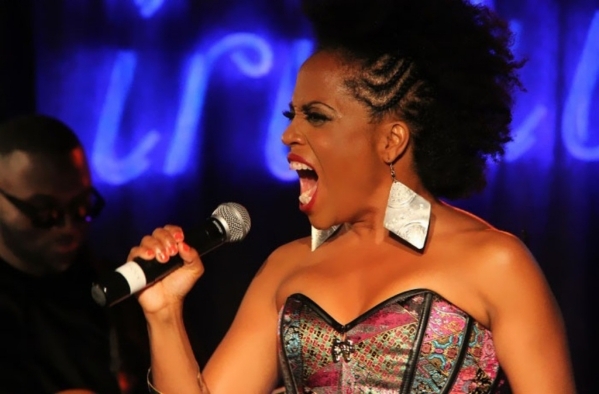Diana Ross’ daughter talks about scary world and power of hair
Diana Ross' daughter, Rhonda Ross, has a 6-year-old son of her own, a child who is "all boy," and despite the fact he fluently speaks four languages in the cultural kumbaya of New York City, she's concerned about his future.
"What's happening in the (national) news right now with police brutality, and all of that, stays with me," Ross told me by phone after whisking her child to two museums in one day by 4 p.m. New York time.
"I have a beautiful black son, and I think about his life, and how best to raise him, and what to give him, and how to protect him, and how to keep him safe, and what to teach him," she said.
Ross herself comes from a big family. Her mother has four other children. Her father Barry Gordy, fathered eight. This Thursday, Ross (who has a great voice in R&B, jazz, soul, gospel and funk) will perform at her half-sister Sherry Gordy's "Take the Stage" show at Fiesta Rancho.
Ross and husband, Rodney Kendrick, the jazz composer and pianist, are homeschooling their one child, Raif-Henok Emmanuel Kendrick; he speaks and reads English, Chinese, French and Spanish.
"I do think we're very blessed to be in New York. It's so culturally diverse here," Ross said.
"We were on the subway today, and we bumped into a Chinese family speaking Chinese, and he was speaking with them, and playing with the kids. And then we left there and came to a play date with these black boys who speak French," Ross said.
They live in Harlem, and Raif understands multiculturalism "because we're in New York," she said, "it's not something he's reading in a book."
Ross may be concerned about, at the very least, the racial nightmare stories that have been riddling the news for a few years now. But the mother in her refuses to lose hope.
"I'm an optimistic person in general. So I believe that he will be fine, and I believe we, as the human race, will be fine," she said.
"But we are in a really interesting, scary, volatile moment right now. And I feel that the answer to it is self-love, and self-empowerment."
She succinctly identifies the socioeconomic-political clash of our times:
"People are scared that 'others' are taking something away from them, that the world is not what it used to be, and they want to turn back the clock, and the other side wants to hurry up and turn it forward."
She told me this is the core she wants to give to her son:
"We can feel at peace within ourselves, and know that nobody can take anything from us, that we are endowed with love, and liberty, and beauty, and intelligence, from our creator, and we don't have to fight each other over those resources."
By the way, Ross and I talked about something that may at first seem superficial, but it is not, if you've ever seen the documentary "Good Hair." Ross has incredible hair. This is relevant to her motherhood, as well as to the music she writes and sings.
"I have had natural hair since '94. That's important to me. That's important as to how I walk through the world, but also who I am as an artist," she said.
"That is all part of my voice. The idea of self-love. The idea of accepting yourself as you are. The idea of 'beauty comes in all shapes and sizes and textures' is important to me.
"It's bigger than just a hairstyle, whether it's natural or straight," she said.
As you might imagine, Ross was first taught about self-worth by Diana Ross.
"My mother, despite how big her celebrity was, she never allowed her five children to rest on that. She said, 'If you want to be something, you are worthy of being something — in your own right. You have to work at it. You've gotta have your own voice, and have your own things you want to say to the world, and your own reasons for being.'
"None of us went into it trying to replicate what she did, or who she was. We all went into it because of a specific love that we had for it, and a desire to tell our own story."
Of course, everyone's own story changes over time and circumstance. Ross knows what her story was, is, and may be.
"My voice from when I was 30 is different from now, at 44. It changes, and it should. My life is different, my perspective is different, my opinions are different — I now have a 6 year old. That's changing things, how I see the world, and what I want to talk about."
Doug Elfman can be reached at delfman@reviewjournal.com. He blogs at reviewjournal.com/elfman. On Twitter: @VegasAnonymous
Like Neon Las Vegas on Facebook:















